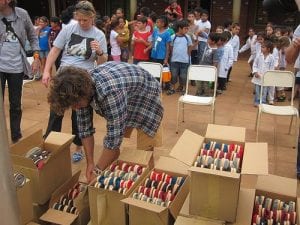A huge company that everyone recognizes is TOMS shoes, right? TOMS is known for their “one for one” mantra, when someone buys a pair of shoes, a person in need will also get a pair of shoes for free. Sound all fine and dandy?
Actually, this “one for one” policy is destroying the markets in other countries.
Think about it. When a truckload of free shoes come in to the country, are people going to want to go to a store and pay for shoes when they can just grab a pair for free? I don’t think so.
Thus, the people that own the shoe stores in the area will go out of business one by one and then the market will go downhill. Then, everyone will need free shoes because they can’t afford to buy them on their own and all of a sudden they are completely dependent on TOMS and other companies that donate free goods.
Here is another site that discusses TOMS more in depth in the aspect of charity.
Kenya actually banned the donation of free clothes to try to remedy this.
This issue is made worse by the spontaneity of the donations.
Even in Haiti, after the 2011 earthquake that devastated the country, there is more money circulation between NGOs that have flocked there than there is in the Haitian government.
The article linked below talks about how humanitarian aid is causing so many issues in Haiti.
For example, the earthquake transformed Haiti into an aid hotspot, with many NGOs flocking to the country and distributing free rice.
Once considered an uncommon and expensive meal, rice became a staple provided three meals a day, seven days a week. The distribution of free rice contributed to its diminished value, which affected the local economy and incomes of several local Haitian farmers.
This has become such a prevalent issue in today’s world that people have even created theories about it, one being the dependency theory, which is elaborated in the video below.
We want to know what you guys think about this topic! We created a poll for you that is linked below that we would love for you to answer!
http://www.easypolls.net/poll.html?p=5a271b83e4b055c80d6240d0
Elise Thren, Hyeji Suh, Nell Beatty





This relates to the idea that we must not help people, but instead help people to help themselves. When so much is given for free, the economy will develop a dependency on this free stuff being imported and shift away from the making of these goods locally. This relates to our topic of the harm in charity; the creation of dependency also then spirals into a lack of self sufficiency and harm for local markets. Overall, I really like this post. The images flow well with text and the articles that are linked are very useful and informative.
This points out probably one of the most important concepts in humanitarian aid – not everything about “giving back” is promising and helpful to a host country. If anything, “giving back” hurts the host country economically, socially and perhaps politically. Instead of helping in the way that TOMS Shoes thought would be beneficial, one would be better off supporting local shoemakers. I think this issue goes hand-in-hand with the issues with charity. In this way, charity provokes this issue of dependency.